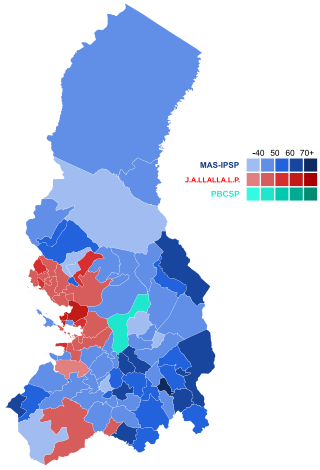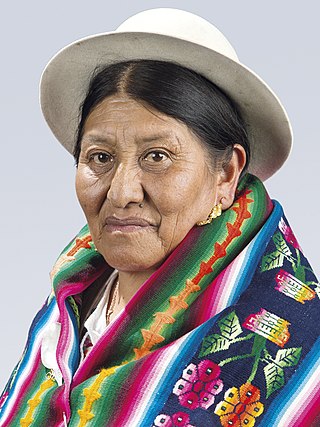
The ayllu, a family clan, is the traditional form of a community in the Andes, especially among Quechuas and Aymaras. They are an indigenous local government model across the Andes region of South America, particularly in Bolivia and Peru.

Qullasuyu was the southeastern provincial region of the Inca Empire. Qullasuyu is the region of the Qulla and related specifically to the native Qulla Quechuas who primarily resided in areas such as Cochabamba and Potosí. Most Aymara territories which are now largely incorporated into the modern South American states of northern Chile, Peru, Bolivia and the Argentine northwest were annexed during the reign of Sapa Inca Huayna Cápac in the sixteenth century.
The Confederation of Indigenous Peoples of Bolivia is a national representative organization of the Bolivian indigenous movement. It was founded in October 1982 in Santa Cruz de la Sierra as the Confederation of Indigenous Peoples of the Bolivian East, with the participation of representatives of four indigenous peoples of the Bolivian East: Guarani-Izoceños, Chiquitanos, Ayoreos and Guarayos.
Apu Mallku is an Aymara title meaning "supreme leader" or "king" conferred on a Mallku or "prince". The Apu Mallku's mandate is to oversee the vast network of Ayllus, an ancient Andean system of governing councils that predates even the Inca empire. It appears that the mandate of the Apu Mallku was initially restricted to the Collasuyu but it could now be interpreted to extend to the bounds of the much larger former Inca realm of the Tawantinsuyu which stretched throughout the Andes incorporating the modern states of Bolivia, Peru, Ecuador, Chile and Argentina. The self-appellation for the people of this combined territory is Qullana.
Antonio Machaca is an indigenous leader from Bolivia who served as the elected Apu Mallku, or spiritual leader, of CONAMAQ - Consejo Nacional de Ayllus y Markas del Qollasuyu for 2004. He was succeeded by Evo Morales.
The National Coordinator for Change is a Bolivian political coordination of social movements aligned with the governing Movement for Socialism-Political Instrument for the Sovereignty of the Peoples (MAS-IPSP). It was founded on 22 January 2007, during the Constituent Assembly of 2006-2007. CONALCAM mobilizes its member organizations in support of the "process of change" which includes the drafting and implementing of a new Constitution as well as a variety of social reforms.

The Plurinational Electoral Organ is the independent electoral branch of the government of Bolivia. It replaced the National Electoral Court in 2010.
The Pact of Unity is an evolving national alliance of Bolivian grassroots organizations in support of indigenous and agrarian rights, land reform, the rewriting of the 1967 constitution through a Constituent Assembly, and a left-indigenous transformation of the Bolivian state. Since 2005, the Pact has been a close ally of Bolivian President Evo Morales, and it forms the nucleus of the National Coordination for Change, a pro-government alliance.

General elections were held in Bolivia on 12 October 2014, the second to take place under the country's 2009 constitution, and the first supervised by the Plurinational Electoral Organ, a newly created fourth branch of government. Incumbent President Evo Morales was re-elected for a third term.
The Green Party of Bolivia is a political party in Bolivia, which has a green political orientation. Founded in 2007, it participated in the 2014 general elections, in opposition to the reigning President Evo Morales and the Movement for Socialism. The party is a member of the Global Greens, an international network of green parties, and an observer of the Federation of the Green Parties of the Americas, a regional network of the same.

Rafael Arcángel Quispe Flores, often referred to as Tata Quispe, is a Bolivian indigenous activist and politician who served as general executive director of the Indigenous Development Fund from 2019 to 2020. He previously served as a substitute party-list member of the Chamber of Deputies from La Paz under María Eugenia Calcina from 2015 to 2019.
Events in the year 2021 in Bolivia.

The 2021 Bolivian regional elections were held on 7 March 2021. Departmental and municipal authorities were elected by an electorate of approximately 7 million people. This was the third regional election under the 2009 constitution. It was postponed from the expected date of 2020 due to the 2019 Bolivian political crisis and delays in holding the 2020 Bolivian general election. All elected authorities assumed office on 3 May.

Santos Quispe Quispe, commonly known as Wayna Mallku, is a Bolivian doctor and politician serving as governor of La Paz since 2021. A member of Forward United People, of which he is the leader, Quispe was a relative unknown in politics until he replaced his late father, the renowned peasant leader Felipe Quispe, as Jallalla La Paz's candidate for the governorship of the La Paz Department. Shortly after winning the election, Quispe terminated his party's pact with Jallalla, establishing a confrontational attitude with the Departmental Assembly for the duration of his term. In early 2022, he was sentenced to house arrest with the right to work after being discovered allegedly intoxicated at his office.

The 2021 La Paz gubernatorial election was held on Sunday, 7 March 2021, with a runoff taking place on 11 April 2021, involving separate contests for governor and all forty-five seats in the Departmental Legislative Assembly. Incumbent governor Félix Patzi unsuccessfully sought reelection to a second term, finishing in fourth place with 4.36 percent of the popular vote. The election was won by Jallalla La Paz's Santos Quispe, who attained 55.23 percent of the vote in the second round, defeating Franklin Flores of the Movement for Socialism. On the legislative ballot, the Movement for Socialism won sixteen of the twenty provincial circumscriptions and nine of the twenty party-list seats, retaining its twenty-five seat majority in the Legislative Assembly.

Severo Aguilar Gabriel is a Bolivian politician and trade unionist who served as a member of the Chamber of Deputies from Potosí, representing circumscription 41 from 2010 to 2015. A member of the Movement for Socialism, he previously served as a member of the Constituent Assembly from Potosí, representing the same circumscription from 2006 to 2007.

Luis Gallego Condori is a Bolivian lawyer and politician who served as a member of the Chamber of Deputies from Potosí, representing circumscription 39 from 2010 to 2015. Born in a peasant community in one of the least developed regions of rural Potosí, Gallego completed only portions of his primary education before dropping out to focus on agricultural work. As a young adult, he began scaling the ranks of traditional leadership, holding posts of both cultural and political significance within his Quechua community. In 2009, he was elected to the Chamber of Deputies on behalf of the Movement for Socialism, a party he militantly supported, only to later grow disenfranchised with.

Samuel Plata Plata is a Bolivian auto mechanic and politician who served as a member of the Chamber of Deputies from La Paz, representing circumscription 22 from 2010 to 2015. Born in a peasant community in the Altiplano plateau, Plata scaled the ranks of traditional leadership, serving as president of the Chuncarcota school board, mallku of his Aymara township, and finally, jach'a mallku cantonal of the three ayllus in the Urinsaya Marka, the sector's highest indigenous authority. Plata's prominent local presence led regional peasant sectors to nominate him as their representative in the Legislative Assembly, with the Movement for Socialism sponsoring his successful candidacy for a seat in the Chamber of Deputies.

Plácida Espinoza Mamani is a Bolivian educator, politician, and trade unionist who served as senator for Oruro from 2015 to 2020.












